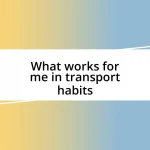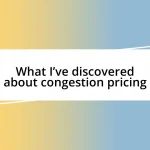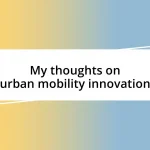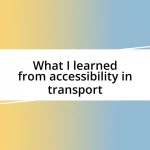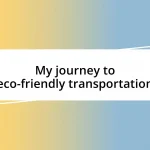Key takeaways:
- Carpooling offers financial savings, reducing monthly costs on fuel, parking, and maintenance, while prolonging vehicle life.
- It fosters social connections and community, transforming mundane commutes into opportunities for camaraderie and support among participants.
- Carpooling enhances safety by sharing driving responsibilities, reducing fatigue, and promoting accountability, thereby decreasing accident risks.

Understanding carpooling advantages
Carpooling has several compelling advantages that often go unnoticed. For instance, when I participated in a carpool for my daily commute, I found not just savings on gas, but also a delightful camaraderie that made the morning grind much more bearable. Have you ever found yourself stuck in traffic, wishing you had someone to chat with? That shared experience can turn a tedious drive into an enjoyable moment of connection.
Moreover, it’s fascinating to realize the environmental impact of carpooling. Each time I share a ride, I’m not just saving money; I’m actively contributing to reducing carbon emissions. Have you thought about the difference you could make if more people embraced this habit? When my friends and I pooled our resources, not only did we lessen our individual carbon footprints, but we also sparked conversations about sustainability that deepened our friendships.
Lastly, consider the stress relief that comes from carpooling. On days when I carpooled, the anxiety of navigating the busy roads faded as I shared the driving responsibilities. Isn’t it nice to pass the wheel occasionally? By sharing the ride, I learned that supporting others can be just as rewarding as the convenience it brings to my own life.

Environmental benefits of carpooling
Carpooling significantly benefits the environment, and I’ve seen this firsthand. Each ride shared translates to fewer vehicles on the road, which means less traffic congestion and lower air pollution. I remember feeling a sense of accomplishment every time I hopped into a friend’s car for our commute; it felt like I was making a small yet meaningful contribution to the planet. The image of our cars gathering together in the parking lot always reminded me of how collective efforts can lead to substantial change.
Here are some key environmental benefits of carpooling:
- Reduced Emissions: Fewer cars mean lower greenhouse gas emissions. With my small group of friends, we collectively cut our carbon output significantly.
- Decreased Fuel Consumption: Sharing a ride effectively lowers fuel use. I found that pooling our trips saved us all from guzzling gas individually.
- Less Traffic Congestion: Carpooling alleviates road congestion, which can lead to improved air quality. I’ve often noticed how quickly we could move along when we were fewer on the road.
- Conservation of Resources: By carpooling, I’m contributing to the efficient use of energy and resources, aligning with my values of sustainability. It felt rewarding to know that my car—and my contribution—was being optimally utilized.
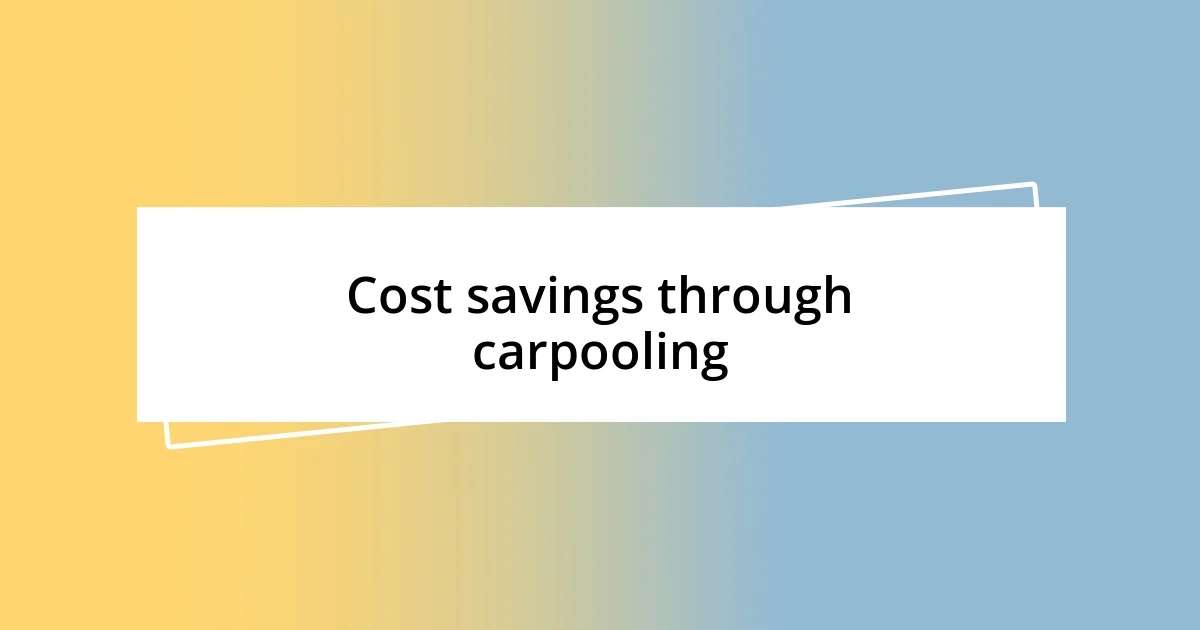
Cost savings through carpooling
Carpooling can truly lighten the financial load of commuting. I recall my initial skepticism; would sharing rides really make a difference? After just a few weeks, I was pleasantly surprised by the amount I saved on fuel and tolls. The shared costs converted my daily drive from a personal expense into a manageable budget-friendly scenario. It’s like splitting a dinner bill with friends—it feels good to share the burden.
Diving deeper into cost analysis, consider how carpooling can reduce wear and tear on your own vehicle. When I started sharing rides, my car spent less time on the road, leading to fewer maintenance issues down the line. Each car service visit became more spaced out. Plus, that meant more savings in repairs and replacements. Have you thought about how much you spend keeping your car in top shape? Sharing the ride not only cuts immediate costs but also prolongs the life of your vehicle.
The overall financial landscape becomes even more attractive when factoring in parking fees. When I carpooled, we rotated parking responsibilities, maximizing our time and reducing individual costs. I remember the relief of finding a spot right by the entrance because one of my friends always got there early. It felt like a win-win: we saved money while improving our daily routine. Carpooling isn’t just about splitting costs; it’s about finding inventive ways to make every trip more efficient.
| Cost Aspect | Traditional Commuting | Carpooling |
|---|---|---|
| Fuel Expenses | $100/month | $40/month |
| Parking Fees | $50/month | $20/month |
| Maintenance Costs | $30/month | $15/month |
| Total Monthly Costs | $180/month | $75/month |

Social connections and carpooling
Sharing rides has a magical way of fostering deeper connections between people. I remember the laughter that echoed through the car during my morning commutes; it felt like I was starting my day with friends rather than just acquaintances. These moments created a bond that transformed mundane drives into opportunities for real conversations and shared experiences. Well, have you ever found that one person in your carpool who became a close friend? That can happen quite easily when you have quiet moments, shared frustrations about traffic, or even the excitement of a concert coming up.
As I think back on my carpooling days, it’s clear that social connections formed through shared rides extend beyond just our immediate circle. I embraced the sense of community that developed—once, we even organized a weekend trip based on our carpooling camaraderie! Those spontaneous adventures deepened our bonds and created memories that I still cherish. It’s fascinating how getting together for a simple ride can lead to planning picnics or even attending events as a group.
The power of these connections isn’t just about friendship; it’s also about shared support. Last winter, when one of my carpool buddies faced a tough time, we rallied together. We took turns bringing them meals and creating a supportive atmosphere, all stemming from our daily interactions. Isn’t it remarkable how something as straightforward as carpooling can weave people together in such significant ways? I believe it’s these connections that truly enrich our lives while making our commutes feel less like a chore.

Safety benefits of carpooling
The safety benefits of carpooling truly make it a compelling option for many commuters. When I think about my own experiences, sharing rides meant that I wasn’t alone on the road. There’s a certain comfort in knowing that I had fellow passengers looking out for each other. In my case, our small group often took turns driving, which not only shared the responsibility but also enhanced vigilance. Have you ever felt safer driving with someone else? It’s that shared alertness that can help reduce the risks of fatigue-induced accidents.
Another aspect I’ve noticed is the potential for lower accident rates. According to studies, carpooling can actually decrease the number of vehicles on the road, which in turn reduces the chances of collisions. I remember driving home one evening after a long day when traffic was heavy. My carpool buddy, sitting in the passenger seat, helped keep me engaged with conversation. I often reflect on how their presence contributed to me being more alert. If you think about it, is there anything more reassuring than having someone with you who can share the driving burden and engage in conversation during those slow-moving commutes?
Moreover, there’s something empowering about carpooling when it comes to personal safety. I find that when I’m in a carpool, I feel a sense of togetherness and accountability. Once, during a late-night drive back home, we encountered a problem with road construction that could have been disconcerting. But having friends in the car meant that we could strategize our options together. We turned that potentially stressful situation into an opportunity to share laughs and navigate our way home. Isn’t it amazing how the bonds formed through carpooling can transform what would typically be a solitary and possibly daunting experience into one of camaraderie and support?

Tips for effective carpooling
To make carpooling effective, it’s essential to establish clear communication among participants. I remember how our group used a messaging app to coordinate rides and share updates. Having a designated chat helped us discuss potential schedule changes, divide driving duties, and even decide on fun stopovers. I’d encourage you to set up something similar—it can really streamline the experience.
Another key aspect is setting some ground rules early on. For example, when I first started carpooling, we discussed topics like acceptable noise levels, shared snacks, and even music preferences. Establishing these norms created a more harmonious atmosphere. Have you ever found that clear expectations can ease potential tension? In my experience, it made all the difference in keeping everyone happy and engaged during our rides.
Finally, don’t underestimate the power of keeping it fun! I often suggested themed music days or trivia sessions to break up the routine. For instance, we’d rotate who picked the playlist for the week, and it turned into a mini contest for the best tunes. I’d recommend adding your twist to make the rides memorable—what creative ideas would you come up with? It’s these little touches that can turn a simple commute into something enjoyable and worthwhile.
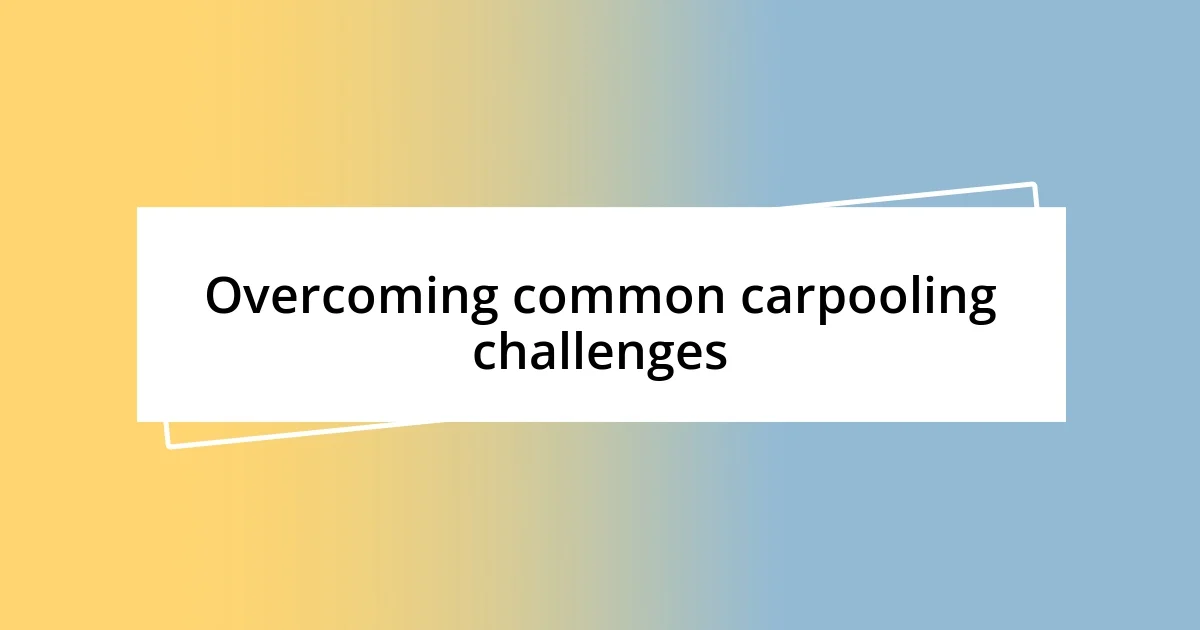
Overcoming common carpooling challenges
One of the most common challenges I’ve faced in carpooling is coordinating schedules. It can be a juggling act trying to find times that work for everyone involved. I remember a time when our group was struggling to align our shifts until we created a shared calendar. This simple solution brought us together, making it much easier to see who could drive on what days. Have you ever tried something like that? It’s incredible how a little organization can make a huge difference.
Another hurdle we encountered was managing different preferences for routes and driving styles. I distinctly recall when one of my friends preferred taking the scenic route, while I was all about efficiency. To overcome this, we started having open discussions before our trips, allowing everyone to voice their opinions and preferences. We even experimented by rotating who chose the route each week. It was a great way to ensure everyone felt heard while discovering new paths and experiences together. Have you found that compromise plays a key role in group dynamics?
Lastly, dealing with unexpected situations, like last-minute cancellations, can be quite frustrating. I once had a fellow carpooler bail on me during a particularly hectic week, and it threw off my entire day. From that experience, I learned the importance of having a backup plan. Whether it’s having an alternative driver ready or simply knowing your public transport options, being prepared can keep you calm. Do you usually expect the unexpected? Embracing flexibility within the group helps network through challenges—and it’s those moments of adaptability that often strengthen our carpool bond.
